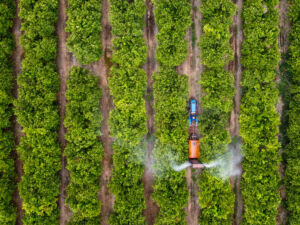Schritt für Schritt plastikfrei - Trans-Sequentielle Analyse und Innovationsforschung
Lukas Sattlegger
Under the leadership of ISOE, the PlastX junior research group is investigating the social role of plastics and their effects on the environment.
The junior research group PlastX, led by ISOE, is examining the societal role of plastic and its impact on the environment. The sub-project Packaging and sustainable consumption is examining possibilities for manufacturing and using plastic packaging more sustainably.
The goal of the research project „Packaging and sustainable consumption“ is to show alternatives to using plastic in packaging. The sub-project is examining how the use of plastic packaging materials can be reduced or replaced by more sustainable alternatives. The research results give decision-makers in the food industry a scientifically sound foundation for making decisions on how to design product packaging in a more sustainable manner. Starting point of the research is the life cycle of packaging (manufacture, use and disposal). Within this cycle, the sub-project will be studying the quality criteria of food packaging (e.g. durability, hygiene, transportability) as well as manufacturers’ marketing strategies. Another starting point is the analysis of lifestyle-specific consumption practices and the views of consumers, for example as regards plastic-packaged organic products, but also with regard to convenience foods (“food to go”).
Together with the Max-Planck-Institute for Polymer Research, the sub-project will also be testing alternatives to conventional plastic packaging, such as bioplastics, on their degradability in terms of sustainability. In this context, both the properties of the packaging and of the underlying polymer necessary for the product (e.g. density, permeability to gases, water etc.) as well as the packaging’s degradability under environmentally relevant conditions are taken into account.
Between 1993 and 2012, the volume of plastic packaging in Germany has doubled. Food packaging accounts for a large percentage of these packages. In Europe, approximately 40% of the plastic produced is used for packaging. Due to improper waste disposal, about 4.8 to 12.7 million tonnes of plastic waste annually are washed into the world’s seas and oceans via the rivers. When the plastic waste decomposes in the ocean, smaller plastic fragments (microplastics) are formed which can become dangerous to the oceanic flora and fauna.
Because of their versatile properties and numerous fields of use, plastics have found their way into many areas of everyday life during the past few decades. On the other hand, the manufacture, use and disposal of plastic causes environmental problems and risks on a global scale. The accumulation of plastic waste in the environment, for example, is negatively impacting ecosystems. Some of these interventions are of such magnitude that, due to the extended degradation time of most plastics, they will bear witness to human dominance during this era (the Anthropocene) for hundreds of years to come.
Max-Planck-Institute for Polymer Research (MPI), Department of Physical Chemistry of Polymers
Partners of the sub-project come from the fields of food retailing and consumer protection.
The junior research group „PlastX – Plastics as a systemic risk for social-ecological supply systems“ is funded by the German Federal Ministry for Education and Research (BMBF) as part of the programme „Research for sustainable development (FONA)“. In FONA, PlastX belongs to the funding priority „SÖF – Social-ecological research“ within the funding area „Junior research groups in social-ecological research“.
Lukas Sattlegger
Lukas Sattlegger
Lukas Sattlegger, Elisabeth Süßbauer
Johanna Kramm, Carolin Völker
Lukas Sattlegger
How do chemicals affect health, ecosystems and the economy? How can we create a better understanding and greater awareness of pollutant risks?
Go to Topic Page
